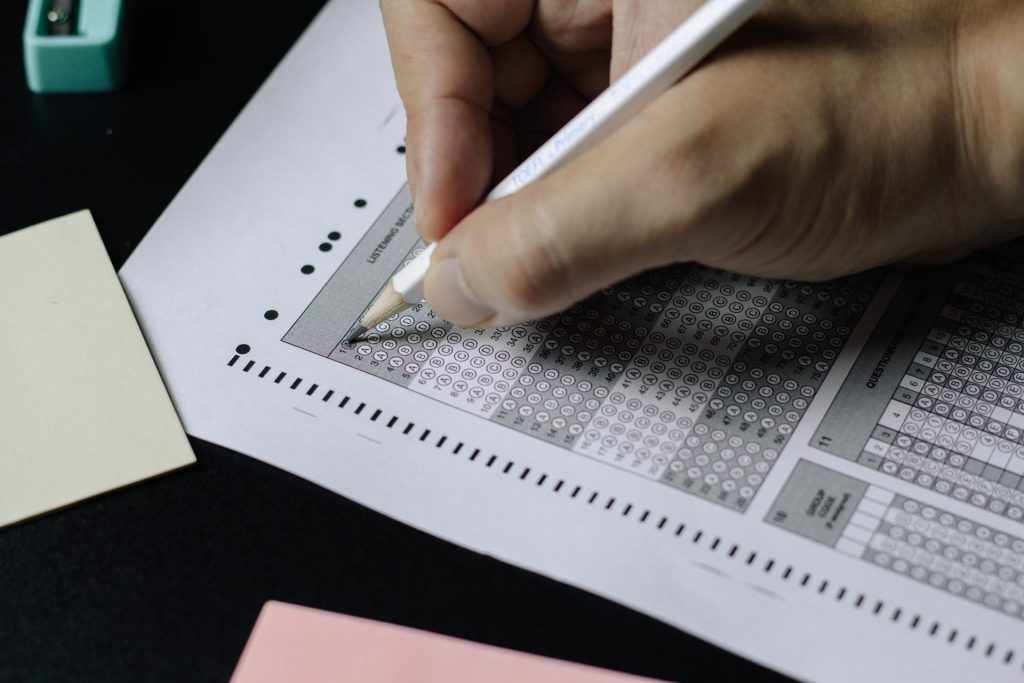
Image by Unsplash
If you’ve ever grumbled that “I’m not a good test taker” or “I simply don’t perform well on exams,” you’d best read this article carefully.
There are several fast and simple methods you may enhance your test-taking skills, even whether the exam is tomorrow and it’s the state test, the SAT, ACT, GRE, LSAT, or simply your standard MCQ test at school. Of course, if you choose not to prepare, you won’t perform well on it.
Think it’s a miracle? It’s not. Going from being a mediocre test-taker to an excellent test-taker is simpler than you would imagine. Check out the following suggestions for methods to up your testing game.
Maximum Hours One Can Study in a Day

Image by Unsplash
What are the maximum hours one can study in a day? What’s the worst time to study? How much time should I spend studying? These are some of the most frequent queries students who are not a good test taker ask.
There is no one solution that works for everyone, making it a challenging question. There is no magic amount of study hours that will ensure you pass your tests. Because studying properly is more important than studying for a long time, as we all know. Some students do in two hours what would take another person four, and both are acceptable.
It’s about getting the most out of your learning and efficiency in the time you have. Your ability to overcome test anxiety may be greatly enhanced by effective time management.
Start Studying Like This If You Are Not A Good Test Taker

Image by Unsplash
1. Study with the Pomodoro method
Francesco Cirillo developed the Pomodoro study method, a time-management strategy, to increase productivity in 1987. The technique is setting a timer for 25 minutes, during which you must work attentively until the timer goes off: a Pomodoro session. He used the Pomodoro study method to prepare for an approaching university exam when he tried it for the first time.
Pomodoro study method could be a answer to question that asks maximum hours one can study in a day. Do you wonder it? Let’s learn more about it. How to Use the Pomodoro Method?
1) Choose the length of your intervals
A general rule of thumb is 25 minutes with a 5-minute break, however, it varies in every class. The ability to concentrate relies on individual discipline and attention span. If 25 minutes is too little time, extend it to 45 or 50 minutes and take a 10-minute break in the middle. The time may be adjusted based on preferences and the number of jobs that need to be finished.
2) Avoid leaving the study area too much while taking breaks.
When you take that break, avoid playing video games or binge-watching TV on your sofa. You wouldn’t want to halt your academic progress and resume your procrastination. So, it is advisable to avoid any potential distractions that might lead to procrastination. Instead, make the most of the break by going for a stroll around your home or getting a cup of something energizing.
3) Decide what work you need to finish.
Make sure you have a clear goal for what you want to achieve by the conclusion of each interval before you start.
4) Get away from your desk when you take breaks.
The method only works when your brain recognizes that you are receiving a reward after a taxing 50 minutes. To tell your brain that you are taking a break, you need to modify your surroundings and the activities you are doing. During your break, avoid picking up your book or opening your textbook. Take a peaceful break instead.
5) After four intervals or cycles, be sure you give yourself a lengthier rest.
This will guarantee that you are rewarding both your brain and yourself. After a full cycle, take a 20–30 minute rest.
6) Disconnect from your phones and other devices during the break.
Put your phone away from your study desk and turn off the alerts. Your brief break is valuable time that you must use to complete your duties. The goal of the Pomodoro technique is to maintain laser-like concentration for the allotted period. Thus, save your time!
7) Change things up!
Pomodoro study method is intended to be a guide; by all means, if you prefer longer intervals or even missing a few of your breaks in between to maintain your momentum! You decide what is most advantageous to you and best suited to your learning style.
It’s also critical to understand that taking pauses sometimes is necessary for making progress. As a result, always remember to check in with yourself and recognize when you need to take a break or lose concentration.
2. Create a Routine
One of the greatest methods to ensure that studying becomes a daily habit is to establish a study schedule for yourself. Choose what time of day suits you most, and then make a concerted effort to use that window of time to go through your notes, videos, and other relevant materials.
Choose a few times throughout the week to study. If it suits you best, study in the morning one day, the afternoon the next, and the evening the night before exams if there are no other distractions. After you’ve determined the hour that works best for you, attempt to study at that time every day (or at least three days per week) to establish a regular study routine.
Due to extracurricular activities, time with friends, and other responsibilities, your schedule may need to change. But, be sure to give your studies a top priority and complete them in some capacity.
3. Treat Yourself
Treating yourself will give you some incentive as studying may be exhausting. Your favourite coffee shop can sell you a cup of coffee, and the campus convenience store can sell you some food for studying. By giving yourself breaks for enjoyable pursuits like walking, reading, or watching TV, you may also treat yourself. By adding a reward, you’ll have something enjoyable to strive towards.
4. Enjoy Breaks
Keeping with the prior concept, taking pauses is crucial. Take breaks to recharge, increase productivity, and avoid burnout.
Even while it may feel like you need to study nonstop, your brain will start to function less well if you don’t give it a chance to unwind. If now is the worst time to study in your opinion, don’t hesitate to take a break. By taking breaks, you may get the most out of your study time while experiencing the least amount of stress.
5. Be Assured Of Your Academic Abilities
It may be simple to get caught up in the trap of overstressing yourself when you’re studying, but it will ultimately be counterproductive. To help you get ready for your tests, you may manage when and how you study. After that, you must have confidence and make every effort to remember the material.
You may put the tension behind you and put your attention on going ahead by having faith in your abilities and confidence that you can handle this.
6. Study Smarter, Not Harder
The information that will (or won’t) be on an exam may sometimes be disclosed by college teachers; pay attention to them! They’re giving you this knowledge so you may concentrate on the crucial details.
Some students who are not a good test taker tend to spend hours researching irrelevant material. Send your lecturer a brief email to get a confirmation if you’re unclear about what to concentrate on while studying, or chat with him or her after class.
7. Assess And Re-Arrange Your Notes
Whether you’re using a notepad, a laptop, or plain old-fashioned flashcards, reading over each line of your notes can help you make sure you’ve covered all you should have in class and even catch some items you may have missed. Reviewing your notes right away after class and again a few days later is a smart idea. This enables you to take a breather in between revisions so that you may revisit the content with new eyes.
8. Understanding Vs. Memorizing
Knowing the difference between memorization and comprehension is one of the study tips for college that may significantly alter how you approach new knowledge. Without really acquiring the knowledge, memorization just teaches you how to repeat it in a certain amount of time.
For instance, if you’re memorizing a conjugated verb chart for a Spanish test, recalling how the verbs appear in written form will aid in your memory of the material. As it’s a highly unique method of learning, you can forget the verbs’ meanings and how to employ them in a sentence thereafter. When you study Spanish at a higher level, this can catch up with you.
9. Take Power Naps
Memorize what you can before losing your motivation to study, and then go to bed. According to German research, having a power nap in the afternoon (between 1 PM and 6 PM) may significantly increase your memory. This research is not the first to discover a link between sleeping and memory. And it most likely won’t be the last.
You may give your brain a rest from processing new information by taking a sleep. As a result, your brain can analyze and successfully restructure those ideas for improved memory. Now, when you awaken, you may simply access that knowledge.
How Long Should You Take a Nap To Study Better?

Image by Unsplash
Your brain can absorb and remember information more quickly if you get between 30 and 60 minutes of sleep throughout the day.
Your brain moves through Stages 1 and 2 (the lighter phases of sleep) during an hour-long nap before transitioning to slow-wave sleep (deep sleep). This kind of sleep is beneficial for memories based on information learnt since it helps them shift from short-term memory to long-term storage.
Although a 6- to 10-minute nap may briefly maintain memory, lengthier naps that go until deep sleep tend to store memories for longer periods of time and shield them from any outside influences.
So there you have it! Just take a sleep in between studying sessions rather than spending all day doing so. It is excellent for your brain and academic performance! The worst time to study might be a midnoon after studying all night.
Understand 5 Stages of Sleep for a Fatigue-free Morning!
Try Alarmy

Image by Alarmy
If you are worried about taking longer naps, try Alarmy. It ensures you’ll get out of bed on time by making you solve a math problem, a puzzle, or other tasks in order to silence your alarm. Also, it includes amazing calming noises that are intended to increase productivity.
Final Words
It’s simple to do poorly on exams, but the trick is to recognize why. You can improve your test-taking skills and study habits if you are not a good test taker.
Consistency in your study habits is crucial. Dont look for shortcuts like the maximum hours one can study in a day or the worst time to study. If you want to ace your next exam and avoid being surprised on test day, you need to study every day.
I hope you can utilize the provided guidance to assist yourself get ready and position yourself for success. The next stage is to implement your plan and continue with a successful test preparation strategy. You may improve your marks if you just adhere to these study strategies for ineffective test takers.



